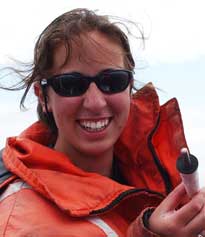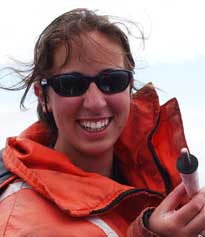 NARRAGANSETT, R.I. – September 30, 2013 – As University of Rhode Island graduate student Tara Stevens nears completion of her doctorate at the Graduate School of Oceanography, she is already celebrating publication of her first book, Whales and Dolphins of Atlantic Canada and Northeast United States.
NARRAGANSETT, R.I. – September 30, 2013 – As University of Rhode Island graduate student Tara Stevens nears completion of her doctorate at the Graduate School of Oceanography, she is already celebrating publication of her first book, Whales and Dolphins of Atlantic Canada and Northeast United States.
Published by Boulder Publications, which publishes a series of field guides to wildlife in the Canadian Maritimes, the book not only profiles 27 species of whales and dolphins found in the northwest Atlantic Ocean, it also provides information about research techniques for studying whales and other oceanographic information not usually found in field guides.
“I wanted this book to be set apart from other field guides,” said Stevens, who grew up in Troy, Maine, and now lives in North Kingstown, R.I. “It contains information that the general public can enjoy, as well as a higher level of detail on some topics.”
Stevens had no plans to write a field guide to whales until she was contacted by the publisher, who said she was recommended by one of Canada’s leading authorities on whales, Hal Whitehead. Whitehead had heard about Stevens’ research on killer whales off the coast of Newfoundland and didn’t have time to write the book himself, so he recommended the URI student, with whom he had collaborated in the past.
“I was just starting my Ph.D., so it was a very busy time for me,” she said, “but I just couldn’t say no. I thought it was a good idea to put out a new type of identification book, one that had more content in it and updated data.”
Writing the book took Stevens two years and included a collaboration with her mother, Patricia Stevens, an artist who provided all of the book’s illustrations.
“It was a great experience to work on this with my mom,” said Stevens, who began her doctoral studies at Memorial University in Newfoundland before transferring to URI. “Whenever I would go visit her, she would show me the drawings she had completed and I would make suggestions. It was really fun. I had never done anything like that with her before.”
The biggest challenge, however, was making the time to complete the project. Stevens was in the midst of her killer whale research, and it was difficult to focus on her studies and the book at the same time. With hard work, she was able to solve that problem and added a chapter about her research into her book.
Stevens is conducting the first study of killer whale behavior in the Northwest Atlantic. Working with URI marine scientist emeritus Robert Kenney, she is examining feeding behavior, acoustic behavior, social behavior and other aspects of their ecology.
“Ultimately I want to use that data to compare this population to other killer whale populations around the world,” she said. “Some people say we should consider this population a different species, but we don’t know enough about Atlantic killer whales yet. A lot of research still needs to be done before we can decide if they’re a separate species from the Pacific or Antarctic killer whales.”
When she completes her Ph.D. in 2014, Stevens hopes to study whales for a government agency or study underwater sounds for contractors working with the U.S. Navy.
Her book is available on Amazon.com. It is also being translated into French.
Photo of Tara Stevens (courtesy of Tara Stevens)

